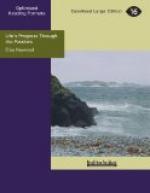The loss of his horses, however, very much vexed him; he bought them, because he preferred that way of travelling to a post-chaise: they had cost him forty louis d’ores in Paris, and knew not whether the country he was in would afford him any so fit for his purpose:—he was just sending his man to enquire where others were to be had, when his own were at the door, without the least damage done either to themselves or saddles:—the farmer who had the care of them while he was at the monastery, found them wandering in the field, and easily knowing to whom they belonged, brought them home.
This was some consolation to him for the loss of his mistresses; and he began to resolve seriously on his departure; but thinking it would be the highest ungenerosity to quit the convent, without acknowledging the favours he had received there, he wrote a letter to the abbess, full of gratitude and civility, telling her, that tho’ the necessity of his affairs required he should take an eternal leave of that place, he should always preserve the memory of those honours he had received in it.—To Elgidia he wrote in much the same strain she had done to him, and concluded with desiring her to believe it was to Heaven alone he could resign her. Those letters he sent by his man, and ordered him to leave them with the portress, to avoid any answers which might have drawn him into a longer correspondence than he desired, or perhaps even have occasioned a revival of those inclinations in him, which he was now convinced of the folly and danger of.
This was the first proof he gave of a firmness of resolution, and was indeed as great a one as could have been expected from a man of the age he was:—it must be owned, that at that time love is the strongest passion of the soul, and as neither Elgidia nor the abbess wanted charms to inspire it, and he had been but too sensible of the force of both, to be able, I say, to tear himself away in the manner he now did, was a piece of heroism, which I with every one in the like circumstance may have power to imitate.
He hired another horse and guide, that he might not lose his way a second time, and departed the same day for the baron’s, where he was received by that young nobleman with the utmost kindness as well as politeness, and found so much in his conversation, and those who came to visit him, and the continual amusements of that place, as made him soon forget all he had partook in the monastery:—he remained there while the baron stayed, and then came with him to Paris.
On his return he frequented the same company, and pursued the same pleasures he had done before; but as nothing extraordinary befel him, I shall not enter into particulars, my design being only to relate such adventures as gave an opportunity for the passions to exert themselves in influencing the conduct of his life.




